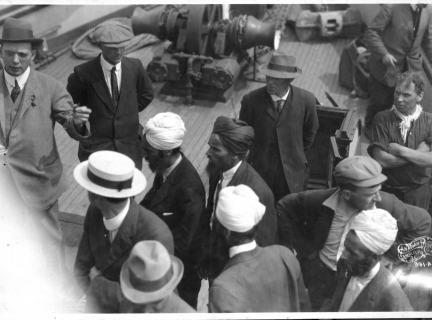1900's - Settlers, Migration, Wars, and Social Change

The 1900's were a remarkable period of social change in British Columbia. Fishing, farming, forestry and mining dominated economic activity. It was also a troubled period of racial and social divisions, most notable the residential school system, race riots, and the internment of Canadian born citizens of Japanese descent.
The 1900's also marked a very colourful political period for the citizens of B.C. Struggles for civil rights were hard fought. British Columbians participated in and witnessed two world wars. It was also a period of outstanding achievement. Many disenfranchised groups finally won the right to vote. Terry Fox embarked upon his Marathon of Hope, and Vancouver hosted Expo 86.
- In 1903, a formal agreement was signed to define the border between Alaska and British Columbia.
- In 1907, an anti-immigration group called the Asiatic Exclusion League marched through Vancouver's Chinatown, leaving much damage in their wake. The group clashed with Japanese and Chinese business owners. A riot ensued.
- In 1914, the Komagata Maru sailed from Hong Kong to Vancouver with 376 passengers from the Punjab region of India. Despite the passengers being British subjects, many who had served in the British army, the ship was forced to return to India with 352 passengers aboard.
- In 1917, after a successful referendum, women of British Columbia won the right to vote.
- In 1941, after the bombing of Pearl Harbour, British Columbia citizens of Japanese descent were sent to camps in the Interior, many losing their homes, businesses and livelihoods.
- In 1971, the Trans-Canada Highway traversing Canada from St. John's, Newfoundland to Victoria, B.C. was completed.
- In 1980, Terry Fox embarked upon his Marathon of Hope to raise awareness and money for cancer research.
- In 1986, Vancouver hosted the 1986 World Exposition, transforming the city forever.
Useful Websites
Digital Library Resources
Recommended Titles
Gently to Nagasaki
c828 K782WK7g
2016
As a child during WWII, Joy Kogawa was interned with her family and thousands of other Japanese Canadians by the Canadian government. Set in Vancouver and Toronto, the outposts of Slocan and Coaldale, the streets of Nagasaki and the high mountains of Shikoku, Japan, it is an account of a remarkable life.
From the West Coast to the Western Front: British Columbians and the Great War
940.371 F73f
2014
It has often been observed that the First World War jolted Canada into nationhood, and as Mark Forsythe and Greg Dickson show in this compelling book, no province participated more eagerly in that transformation or felt the aftershock more harshly than British Columbia.
The Voyage of the Komagata Maru: The Sikh Challenge to Canada's Colour Bar
325.1 J72v2
2014
This new and expanded edition offers the most thoroughly researched account of the notorious Komagata Maru incident. The event centres on the ship's nearly four hundred Punjabi passengers, who sought entry into Canada at Vancouver in the summer of 1914, only to be chased away by a Canadian warship.
Ootsa Lake Odyssey: George and Else Seel--a Pioneer Life on the Headwaters of the Nechako Watershed
971.182 S45s
2016
From the 1920s to 1952, George and Else Seel lived about sixty kilometres south of Burns Lake near the small farming settlement of Wistaria on the western shore of Ootsa Lake. Like many early twentieth century settlers who migrated to BC's central interior, the Seels came in search of opportunity and prosperity, but the harsh environment posed challenges they could not have imagined.
Mod 'n Lavender: Salt Spring Island in the '60s
971.128 G74m
2016
Mod 'n Lavender is the account of a teen's voyage into adulthood on Salt Spring Island, the trendy hub of the Counter-culture during what was arguably the most tumultuous decade in modern history, the '60's.
Northwest History Index
This card index in Special Collection provides access to the Northwest History Collection, a heritage collection covering the early history and exploration of British Columbia and the Pacific Northwest.
The collection includes:
- magazine and newspaper articles
- pamphlets
- books
- chapters in books
- many other resources
As of August 1998, no new material has been added to the Northwest History Index. It is continued by the British Columbia Index.


